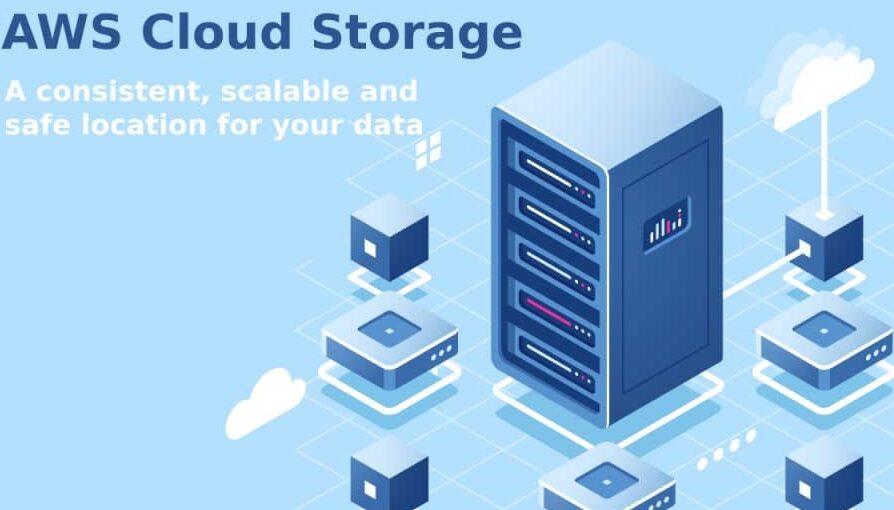AWS Data Storage Solutions – Amazon Web Services (AWS) offers a diverse range of data storage solutions designed to meet the needs of businesses of all sizes. From simple object storage to complex database systems, AWS provides options that are scalable, secure, and cost-effective. In this article, we will explore the various AWS data storage solutions available, their features, and use cases to help you choose the right option for your needs.
Understanding AWS Data Storage Solutions
What is AWS?
Amazon Web Services (AWS) is a comprehensive cloud computing platform offered by Amazon. It provides a variety of services, including computing power, database storage, content delivery, and networking. AWS’s data storage solutions are designed to accommodate different workloads, from small applications to large enterprise systems.
Why Choose AWS for Data Storage?
- Scalability: AWS allows you to scale your storage needs up or down based on demand.
- Durability and Availability: AWS offers high levels of data durability and availability through redundant storage across multiple data centers.
- Security: AWS provides robust security features, including encryption and compliance certifications, to protect your data.
- Cost-Effectiveness: Pay-as-you-go pricing helps manage costs, allowing you to only pay for what you use.
Amazon S3 (Simple Storage Service)
Overview
Amazon S3 is an object storage service that provides highly scalable and durable storage for any amount of data. It is ideal for storing unstructured data, such as images, videos, backups, and big data.
Key Features
- Scalability: Automatically scales to accommodate any amount of data.
- Data Management: Offers features like lifecycle policies, versioning, and cross-region replication.
- Integration: Easily integrates with other AWS services and third-party applications.
- Storage Classes: Various storage classes (e.g., Standard, Infrequent Access, Glacier) to optimize cost based on access patterns.
Use Cases
- Backup and restore solutions
- Data lakes for analytics
- Content distribution and streaming
- Website hosting and media storage
Amazon EBS (Elastic Block Store)
Overview
Amazon EBS provides persistent block storage for use with Amazon EC2 instances. It is suitable for applications requiring consistent and low-latency performance.
Key Features
- Snapshots: Take point-in-time snapshots for data backup and recovery.
- High Availability: Designed for high availability with automatic replication within the same region.
- Performance: Offers various volume types (e.g., SSD, HDD) to meet different performance needs.
Use Cases
- Running databases (e.g., MySQL, PostgreSQL)
- Applications requiring low-latency access
- File systems and application data storage
Amazon EFS (Elastic File System)
Overview
Amazon EFS is a scalable file storage service for use with AWS Cloud services and on-premises resources. It provides a simple interface for creating and configuring file systems.
Key Features
- Scalability: Automatically scales as files are added or removed.
- Shared Access: Multiple EC2 instances can access the same file system simultaneously.
- Performance Modes: Offers standard and max I/O performance modes for different workloads.
Use Cases
- Content management systems
- Big data analytics
- Media processing workflows
Amazon Glacier and Glacier Deep Archive
Overview
Amazon Glacier is a low-cost cloud storage service designed for data archiving and long-term backup. Glacier Deep Archive offers even lower-cost storage for data that is rarely accessed.
Key Features
- Cost-Effective: Extremely low storage costs for long-term data retention.
- Retrieval Options: Multiple retrieval options ranging from expedited to bulk retrieval.
- Data Management: Integrates with S3 for lifecycle management.
Use Cases
- Archiving compliance data
- Long-term backups
- Storing historical data
Amazon RDS (Relational Database Service)
Overview
Amazon RDS provides a managed relational database service for several database engines, including MySQL, PostgreSQL, MariaDB, Oracle, and Microsoft SQL Server.
Key Features
- Automated Backups: Automatically backs up your database and allows for point-in-time recovery.
- Scaling: Easily scale your database instance and storage size with minimal downtime.
- Multi-AZ Deployments: Provides high availability and failover support.
Use Cases
- Web and mobile applications
- Data warehousing solutions
- Enterprise applications
Amazon DynamoDB
Overview
Amazon DynamoDB is a fully managed NoSQL database service that provides fast and predictable performance with seamless scalability.
Key Features
- Managed Service: Fully managed, eliminating the need for server provisioning and maintenance.
- Performance: Single-digit millisecond response times.
- Automatic Scaling: Automatically scales up or down based on demand.
Use Cases
- Real-time applications
- Gaming and mobile backends
- Internet of Things (IoT) applications
Choosing the Right AWS Data Storage Solution
Assess Your Needs
When selecting a data storage solution on AWS, consider the following factors:
- Data Type: Identify whether your data is structured, unstructured, or semi-structured.
- Access Frequency: Determine how often the data will be accessed to choose the right storage class.
- Performance Requirements: Evaluate the performance needs of your applications.
- Cost Considerations: Analyze your budget and consider the cost-effectiveness of different solutions.
Integration with Other AWS Services
AWS data storage solutions seamlessly integrate with a variety of other AWS services, enhancing functionality and simplifying workflows. For example, Amazon S3 works well with AWS Lambda for serverless computing and Amazon EMR for big data processing.
AWS offers a comprehensive suite of data storage solutions tailored to various needs and workloads. By understanding the features and use cases of each service, you can make informed decisions that align with your business goals. Whether you need scalable object storage, reliable block storage, or managed database solutions, AWS has the tools to help you succeed in the cloud.
For more information on AWS data storage solutions, consider visiting the AWS Documentation page for detailed guides and resources.

